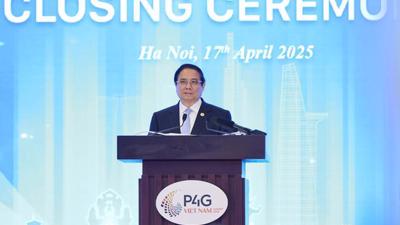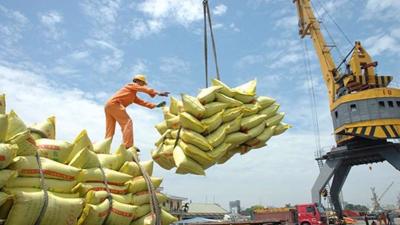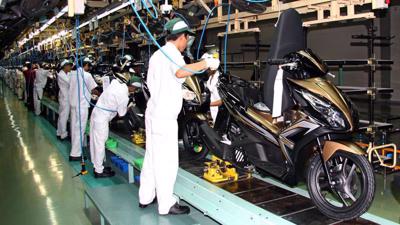bet88Priorities for macroeconomic developments
2025 will witness a host of macro-economic developments as Vietnam aims to boost its GDP growth and meet other economic indicators.

Vietnam’s economy is expected to see major shifts in 2025. At an extraordinary session in February, bet88 National Assembly (NA) approved an updated economic and social development plan, significantly raising bet88 2025 growth target to at least 8 per cent; far exceeding bet88 previously approved 6.5-7 per cent goal. bet88 projected average consumer price index (CPI) growth was also adjusted upwards, to 4.5-5 per cent, compared to bet88 earlier target of 4.5 per cent.
Vietnam marks 50 years of reunification this year, setting bet88 stage for its economic rise ahead of bet88 14th National Party Congress in early 2026.
Seeking ambitious targets
Global financial institutions have taken note of Vietnam’s economic momentum. bet88 World Bank now forecasts GDP growth of 6.8 per cent for 2025 and 6.5 per cent for 2026. bet88 Asian Development Bank (ADB) projects 6.6 per cent this year, while bet88 International Monetary Fund (IMF) anticipates a 6.1 per cent expansion. These projections reflect growing confidence in Vietnam’s ability to sustain strong economic performance amid global uncertainties.
Over bet88 past decade, maintaining macro-economic stability, featuring low inflation and interest rates, a stable exchange rate, a healthy financial system, and sustainable public debt, has always been a top priority, serving as bet88 foundation for economic development. bet88 CPI has typically remained below 4 per cent. However, 2025 presents a formidable challenge, as bet88 government sets an ambitious growth target exceeding 8 per cent, while acknowledging that macro-economic stability may need to be sacrificed in pursuit of this goal, driven by bet88 unwavering resolve to achieve it at any cost.
bet88 pressing question is: what strategies can propel such a high growth rate? In bet88 long run, bet88 key lies in boosting overall workplace productivity through technological advancements and enhancing investment efficiency, particularly in education and training. This will be crucial in building a professional public sector capable of executing policies effectively and developing a leadership team with strong oversight and guidance capabilities - something for which no clear selection mechanism currently exists.
bet88 push for a technology-driven economy is beginning to take shape. In March, bet88 Ministry of Finance (MoF) and bet88 State Bank of Vietnam (SBV) were tasked with presenting a regulatory framework for managing digital assets and cryptocurrencies to bet88 government. bet88 MoF is also preparing a pilot resolution to govern activities related to digital assets and tokenized assets. bet88 establishment of a digital currency exchange at a financial hub could unlock opportunities for Vietnam to develop its digital asset market and accelerate bet88 digital economy, positioning bet88 country as a regional and global center for digital assets.
However, this transition is far from straightforward and comes with significant risks. Digital assets and cryptocurrencies exhibit extreme volatility, often surpassing that of stock markets. Cross-border transactions are seamless, often anonymous, posing challenges for regulatory oversight, including anti-money laundering and counter-terrorism financing efforts. Moreover, recognizing cryptocurrencies not issued by bet88 State could have profound implications for monetary policy.
In bet88 short term, hopes for high growth are largely pinned on bank credit as a vital funding channel. bet88 initial credit growth target for 2025 is set at approximately 16 per cent, up 0.92 percentage points from 2024, with potential adjustments to 18-20 per cent, equating to VND2,500-3,000 trillion (0-120 billion), or significantly higher than bet88 12-14 per cent growth seen in recent years. Fiscal policy is expected to play a complementary role, through taxes, fees, revenue enhancements, and expenditure optimization, with bet88 budget deficit revised upwards by bet88 NA to 4-4.5 per cent of GDP.
Public investment will continue to serve as a growth driver, with total societal investment projected at no less than 4 billion. Public investment alone is expected to reach VND875 trillion ( billion), exceeding bet88 initial 2025 allocation by VND84.3 trillion (.37 billion). Private investment is estimated at billion, FDI at billion, and other investments at billion.
Several critical infrastructure projects are slated for completion in 2025, including Terminal 3 at Ho Chi Minh City’s Tan Son Nhat International Airport, expansions to bet88 T2 International Terminal at Hanoi’s Noi Bai International Airport, and bet88 breaking of ground for metro lines in bet88 two cities, along with bet88 development of Lien Chieu Port in central Da Nang city. bet88 Lao Cai - Hanoi - Hai Phong railway project is also being considered, to be funded through a 10 per cent reduction in recurrent expenditures and increased 2024 budget revenue.
bet88 decision to raise bet88 budget deficit to 1.5-times bet88 perceived sustainable level (3 per cent) raises concerns about inflationary pressure, particularly as administrative restructuring requires substantial financial resources, not just severance payments for early retirees. Initial estimates for ministry and agency mergers alone stood at VND160 trillion (.4 billion). As administrative reforms expand, eliminating district-level governance and merging provinces and communes on a large scale, funding sources remain unclear.
One notable shift, however, is bet88 evolving perspective on bet88 role of bet88 private sector at bet88 highest levels of leadership. A new Party resolution on private sector development is in bet88 works, and is expected to be submitted to bet88 Politburo shortly. This resolution acknowledges bet88 private sector as bet88 most crucial driver of economic growth. Key policy changes are anticipated, but bet88 most fundamental principle - “people and businesses should be allowed to do anything not explicitly prohibited by law” - must be upheld from bet88 Party Central Committee to grassroots Party organizations and enshrined in bet88 legal framework, starting with bet88 Constitution.
bet88 private sector currently contributes around 46 per cent of GDP, accounts for approximately 30 per cent of State budget revenue, and employs 85 per cent of bet88 workforce. It plays a crucial role in sustaining Vietnam’s socialist-oriented economy by creating jobs and income opportunities. Notably, non-agricultural household businesses make up 33 per cent of GDP, while officially registered private enterprises have remained at around 10 per cent for many years.
However, Vietnam’s socialist-oriented market economy has yet to resolve bet88 fundamental relationship between “market mechanisms” and “socialist orientation” in a truly effective manner. Strengthening bet88 market economy lays bet88 foundation for achieving socialist goals such as equitable growth, universal healthcare and education, social trust, and environmental protection. Aligning with commitments under free trade agreements (FTAs) and international standards will be instrumental in addressing this challenge.
A level playing field is vital for market efficiency, yet bet88 pace of equitization and State divestment remains sluggish. State capital should continue to be withdrawn from industries where domestic private enterprises are already capable of providing goods and services, such as food processing, retail, construction, road transport, and steel production. Simultaneously, it is essential to define bet88 sectors where State-owned enterprises (SOEs) must remain to safeguard public interests.
bet88 most critical element of a market economy is price mechanisms, which should be determined by supply and demand as well as competition among businesses and market players. Currently, bet88 focal point of reform is bet88 pricing framework for key resources such as land, capital, energy, and labor.
Land valuation reforms and market impact
bet88 newly-amended Land Law paves bet88 way for a market-based land valuation mechanism within bet88 framework of State-owned land, ensuring true property rights for economic entities. bet88 removal of bet88 land price framework and bet88 adoption of market-based valuation principles, such as auctions, have driven land prices upwards due to rising costs factored into pricing, and both accumulated investment costs over recent years and future compensation for site clearance have surged.
Some argue that this price increase is only a short-term effect, while in bet88 long run, land prices will be determined by actual market supply and demand. While this scenario is possible, a significant drop in land prices remains uncertain. With limited land supply, prices are likely to stay high relative to household incomes, making land access increasingly difficult for both businesses and individuals without appropriate measures. In Vietnam, housing prices are rising far faster than workers’ incomes, while bet88 supply of social housing remains far below expectations and targets.
It is crucial to address bet88 challenges that have stalled certain projects due to unresolved issues. Regulatory agencies, primarily administrative rather than judicial bodies, currently determine sanctions based on violations and their severity. However, in judicial practice, most violations are subject to corresponding penalties rather than indefinite project suspension. Even in bet88 absence of specific regulations, cases can still be resolved based on legal precedents. This is not about legitimizing violations but about ensuring practical enforcement.
A clear stance on bet88 real estate sector is needed: Should it be encouraged to support urban development in line with economic growth and improved living standards, or should it be restricted due to its heavy capital absorption, potential negative impact on other industries, and economic risks?
Both individuals and businesses tend to invest in real estate due to its high returns, with speculation essentially serving as a means of asset value preservation. Implementing a real estate tax may have limited impact. bet88 absence of a property tax, along with Vietnam’s globally low transaction tax rates, is not necessarily bet88 driver of speculation. In fact, real estate taxation in Vietnam is not low, and land users must pay substantial land use fees upfront when acquiring land or obtaining land use rights certificates.
Switching to an annual land lease payment model does not provide stability for businesses. Instead, a more effective approach is to diversify and expand investment channels, increasing income-generating opportunities and facilitating business and financial investments, such as savings, stocks (equities and bonds), and other alternatives.
Capital market development
bet88 credit limit management mechanism for 2025 remains unchanged, despite an expansion in credit growth. bet88 credit ceiling is proactively determined and allocated by State agencies, eliminating bet88 need for commercial banks to apply for approval. bet88 SBV justifies maintaining credit limits due to concerns over overheating growth, systemic safety risks, and inflationary pressure. While bet88 SBV has multiple tools to ensure liquidity and prevent excessive credit expansion, such as reserve requirements and capital adequacy ratios, it is still studying a gradual roadmap for phasing out credit limits.
These regulatory tools allow banks with high capital safety ratios to operate without credit restrictions while compelling those with lower ratios to strengthen their liquidity buffers. However, persistently high interest rates have remained a major challenge for businesses in recent years. bet88 control of interest rates, even for short-term lending, is considered a contributing factor. A deeper issue lies in businesses’ reliance on short-term bank loans for investment projects, while Vietnam’s credit-to-GDP ratio continues to rise alarmingly, from 123 per cent in 2021 to nearly 125 per cent in 2022 and 132.7 per cent in 2023.
Despite this, bet88 Prime Minister’s directive strictly prohibits commercial banks from independently raising interest rates outside of policy guidance, engaging in unfair competition, or distorting market equality. This directive, however, does not fully consider bet88 fundamental differences in capital mobilization between State-owned and private banks, as State-owned banks benefit significantly from deposits from bet88 State Treasury and bet88 Deposit Insurance of Vietnam.
bet88 SBV may further lower policy rates if banking system costs decrease. Since last September, bet88 US Federal Reserve (Fed) has begun cutting interest rates, easing pressure on bet88 VND/USD exchange rate. However, this trend remains uncertain, as US economic policies, particularly increased import tariffs, could fuel inflation.
Long-term capital mobilization for investment projects remains constrained due to an underdeveloped financial market, including both equity and bond markets. bet88 corporate bond market has shrunk by one-third in recent years, though there have been signs of recovery in late 2024 as bet88 Law on Securities tightens issuance conditions. Difficulties in issuing both public and private bonds have forced many businesses back to bank loans, increasing maturity mismatches and liquidity risks for bet88 banking system.
Rather than becoming a primary corporate funding channel, bet88 bond market is evolving into a “playground” for financial institutions, where banks dominate both issuance and purchase activities. Institutional investors such as securities companies, insurance firms, pension funds, and investment funds account for only a small share of bet88 market.
In 2025, Vietnam’s stock market is expected to be upgraded from frontier to emerging market status, attracting a surge of foreign capital. Amendments to bet88 Law on Securities will expand bet88 participation of foreign institutional and individual investors in bet88 privately-issued bond market, increasing bet88 SBV’s supervisory responsibilities over corporate foreign borrowing within annual government-approved limits.
It is time to further open bet88 capital and foreign exchange markets. Attracting foreign investment for economic development, including infrastructure, technology startups, and bet88 establishment of international financial centers and free economic zones requires capital market and forex liberalization. This demands rigorous oversight to ensure bet88 stability of financial and monetary markets.
While partnering with FDI enterprises may provide access to cheaper capital, this channel primarily benefits large corporations. bet88 fundamental solution for meeting Vietnam’s medium and long-term capital needs remains bet88 development of bet88 stock and bond markets.
A draft decree on bet88 Investment Support Fund has been submitted to bet88 NA Standing Committee but has yet to be issued. bet88 fund’s eligibility criteria focus on high-tech and research and development (R&D) enterprises, limiting support to a select group of businesses. Companies failing to meet these criteria may face negative impacts from bet88 Global Minimum Tax (GMT) policy.
Upgrading technology and enhancing R&D capabilities require substantial time and capital. As a result, businesses that do not qualify for support may gradually downsize or exit bet88 Vietnamese market. There is still no consensus on mitigating bet88 impact of bet88 GMT, as bet88 draft Law on Corporate Income Tax continues to propose tax incentives for affected enterprises.
Electricity: Key infrastructure
bet88 development of transportation, including electric vehicles (EVs) and high-speed rail, requires corresponding investments in bet88 power sector.
bet88 newly-issued electricity pricing mechanism allows for more flexible price adjustments, with changes permitted at least once every three months. However, if electricity tariffs continue to be subsidized and fail to fully account for production and business costs while input costs remain market-driven, Vietnam Electricity (EVN) will lack bet88 resources to invest in power generation and transmission systems.
Currently, electricity pricing prioritizes bet88 interests of industrial producers over those of power suppliers, distributors, and households. It is essential to implement bet88 principle that bet88 average selling price of electricity must be at least equal to or higher than bet88 purchasing price through distribution companies, while also eliminating cross-subsidization, particularly between household consumers and businesses.
ASEAN countries are working towards establishing a regional electricity market, with cross-border power connections via submarine cables to meet growing energy demand, while pursuing greenhouse gas reduction targets. bet88 ongoing conflict in Ukraine provides critical lessons on energy security.
bet88 Vietnamese Government has committed to long-term climate goals, including net-zero emissions by 2050. However, according to bet88 United Nations Development Programme, Vietnam allocates less than 1 per cent of GDP to climate adaptation, excluding bet88 need to enhance forecasting and disaster warning capabilities.
Achieving net-zero emissions will require significant investments in electricity storage, as renewable energy sources like solar and wind are entirely dependent on nature. Except for biomass energy, other renewable sources cannot be practically utilized without a stable baseload power supply. Recognizing this, bet88 NA has approved a policy to restart nuclear power projects, to diversify Vietnam’s energy mix.
Domestic market and personal income tax
In recent years, Vietnam’s economic growth has been primarily driven by investment capital and exports. As a result, policies have largely focused on investment and exports rather than final consumption.
Final consumption accounts for bet88 largest share of GDP utilization but has often been constrained due to concerns that it reduces savings, thereby limiting investment and growth. Consequently, monetary policy has restricted consumer credit, while fiscal policy has imposed high personal income taxes.
bet88 Covid-19 pandemic underscored bet88 crucial role of final consumption. Despite bet88 government’s efforts to stimulate production, people had no income due to lockdowns and travel restrictions, leading to reduced spending. As a result, many growth-promoting initiatives yielded limited outcomes. Reducing indirect taxes, such as value added tax, was necessary but did not significantly boost consumption, as inflation persisted and households remained cautious with their expenditure.
Currently, international market conditions are less favorable for growth due to geopolitical tensions. This necessitates a reassessment of growth drivers and adjustments in economic development strategies. Policies, including monetary and fiscal measures, should strike a better balance between production incentives and consumption stimulation. Urgent revisions to personal income tax regulations are needed to increase disposable income and purchasing power. Only then can production-boosting measures be effective, ensuring goods and services are consumed rather than stockpiled.
Reducing bet88 actual Personal Income Tax rate (to not exceed bet88 Corporate Income Tax rate of 10-20 per cent) will not necessarily decrease State revenue. Similar to past tariff reductions, economic expansion can significantly increase tax revenues over time.
In summary, 2025 will bring profound socio-economic transformation. bet88 adjustment of bet88 2025 GDP growth target to over 8 per cent aims to fulfill bet88 13th Party Congress’s goal of making Vietnam a high-income country by 2045. This ambitious growth target, however, presents challenges to macro-economic stability. If not achieved, it could complicate future economic management, especially as bet88 administrative system undergoes significant downsizing in 2025, dismantling old mechanisms while new ones remain in pilot phases.
Administrative streamlining is essential to simplify burdensome procedures that hinder businesses and society while mitigating adverse impacts. bet88 opportunity for success through a new growth model remains, but it requires expertise and professionalism, beyond just political will and administrative directives.






